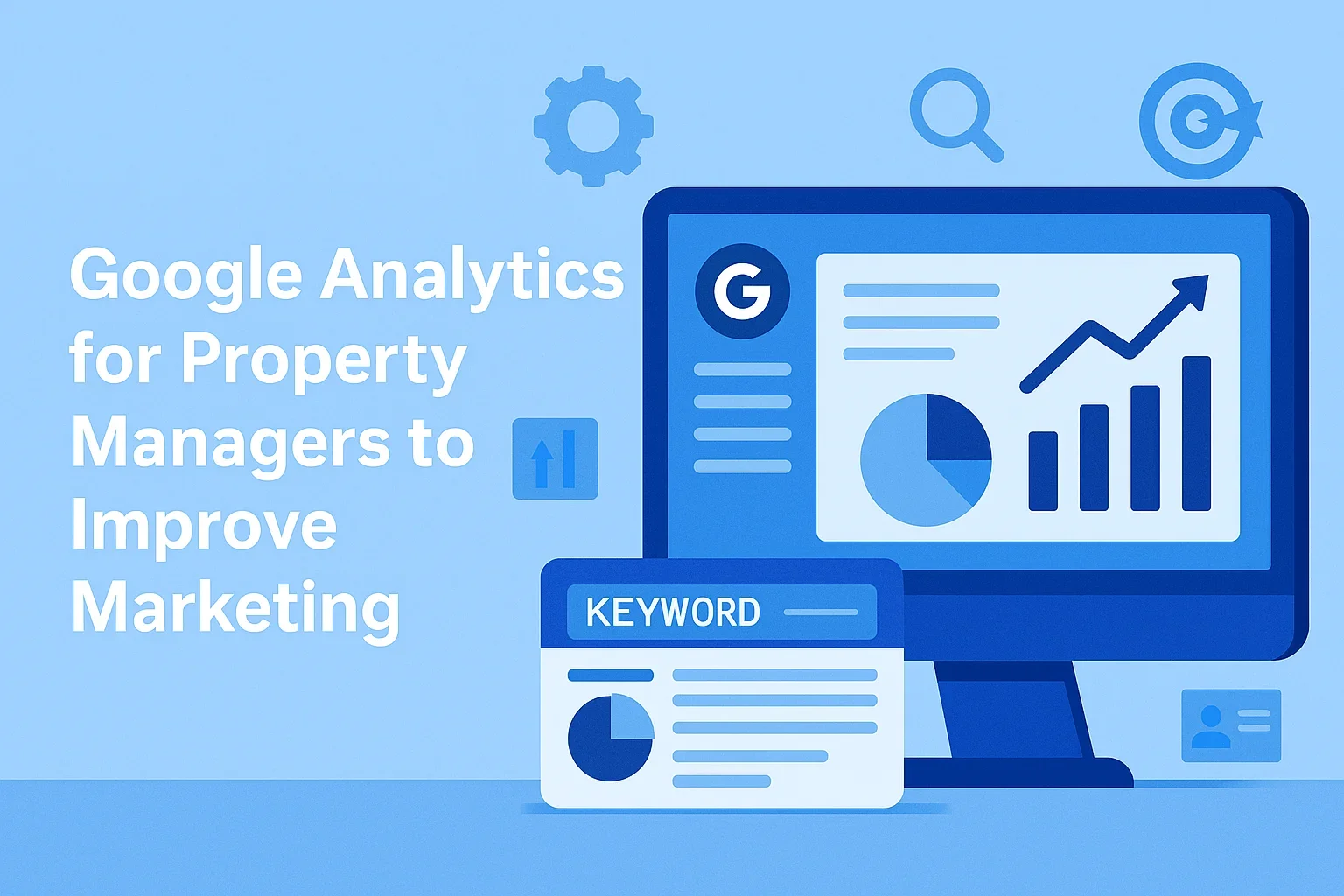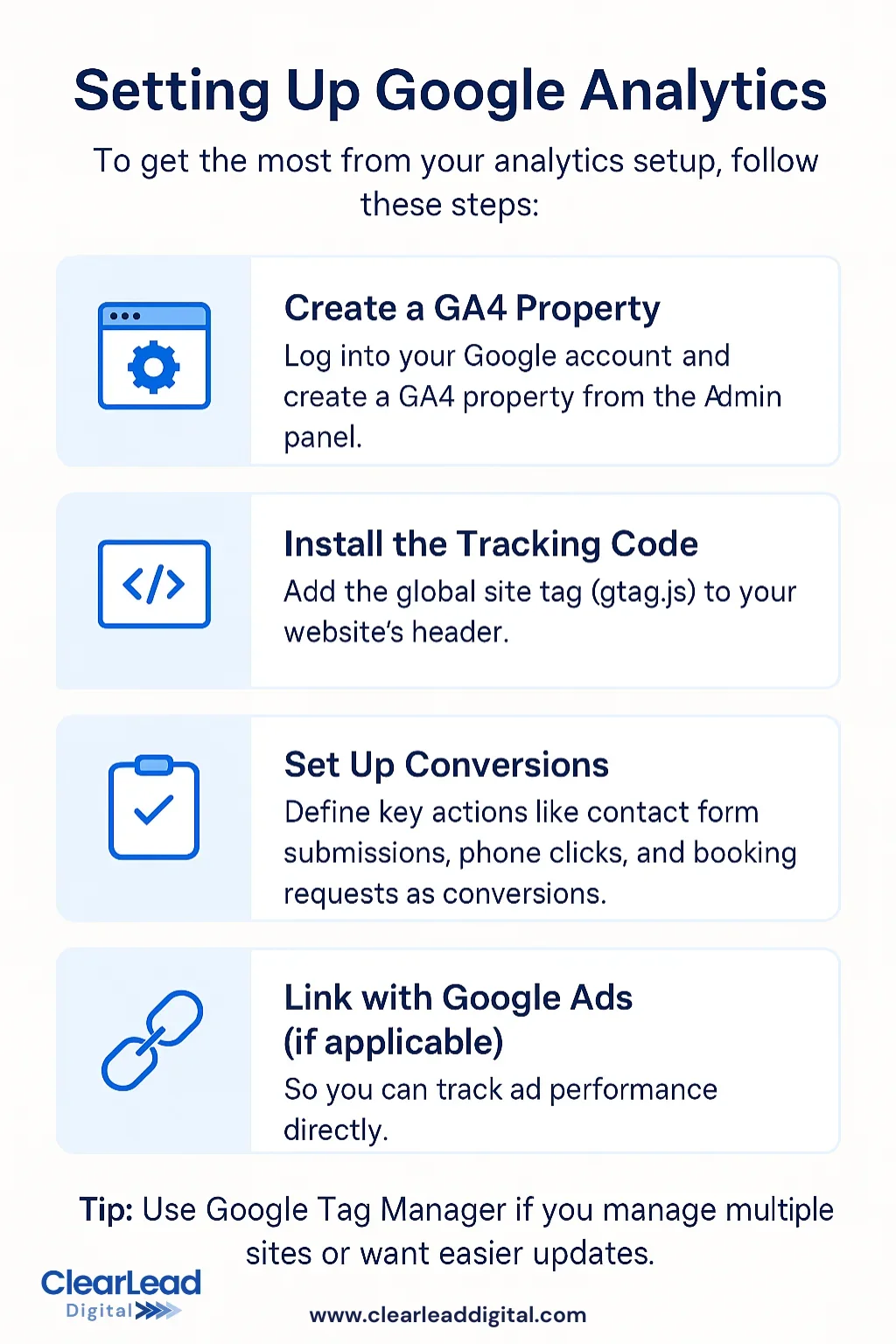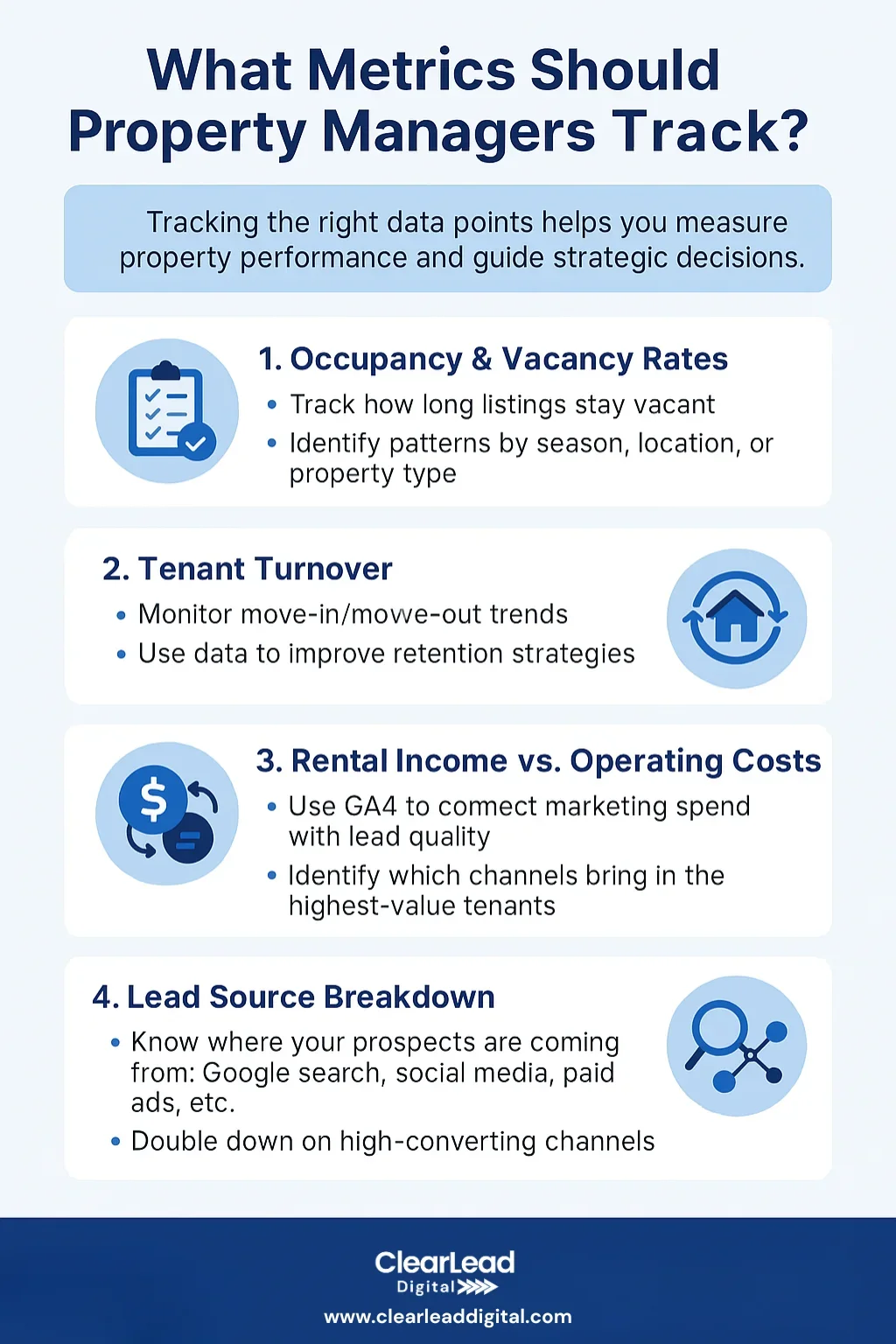Google Analytics for Property Managers to Improve Marketing
Last Updated: August 2, 2025
In property management, knowing how visitors interact with your website can make or break your marketing strategy. That’s where tools like Google Analytics for Property Managers and GA4 (Google Analytics 4) come in. These platforms help property managers track user behavior, improve online performance, and make data-backed decisions.
Let’s break down how you can use Google Analytics and GA4 to manage your rental properties more efficiently and boost tenant retention.
Table of Contents
Why Property Managers Need Data Analytics
Data is one of the most valuable assets in property management. It helps you:
Understand tenant behavior and preferences
Track website performance
Measure marketing ROI
Spot issues before they become expensive problems
Without data, you’re guessing. With data, you’re making smarter, evidence-based decisions.
What Is Google Analytics & GA4?
Google Analytics is a free tool that tracks and reports website traffic. GA4 is its newest version, built to track users across devices and provide deeper insights using machine learning.
Key features of GA4 include:
Event-based tracking (vs. session-based in Universal Analytics)
Cross-platform reporting (web + app)
Predictive analytics using AI
Custom dashboards and detailed segmentation
These features are especially useful for property managers trying to understand how prospects and tenants interact with their websites.
Setting Up Google Analytics for Property Managers
To get the most from your analytics setup, follow these steps:
Create a GA4 Property: Log into your Google account and create a GA4 property from the Admin panel.
Install the Tracking Code: Add the global site tag (gtag.js) to your website’s header.
Set Up Conversions: Define key actions like contact form submissions, phone clicks, and booking requests as conversions.
Link with Google Ads (if applicable): So you can track ad performance directly.
Tip: Use Google Tag Manager if you manage multiple sites or want easier updates.
Best Practices for Tracking Property Management Metrics
To get clean, useful data:
Test tracking on all pages (especially mobile)
Set up filters to exclude internal traffic
Use custom events for important actions (e.g., “Schedule a Tour” clicks)
Regularly audit your setup to fix any tracking breaks
Curious where you rank for your top services? [Get Your Visibility Snapshot]
What Metrics Should Property Managers Track?
Tracking the right data points helps you measure property performance and guide strategic decisions.
1. Occupancy & Vacancy Rates
Track how long listings stay vacant
Identify patterns by season, location, or property type
2. Tenant Turnover
Monitor move-in/move-out trends
Use data to improve retention strategies
3. Rental Income vs. Operating Costs
Use GA4 to connect marketing spend with lead quality
Identify which channels bring in the highest-value tenants
4. Lead Source Breakdown
Know where your prospects are coming from: Google search, social media, paid ads, etc.
Double down on high-converting channels
How to Use GA4 for Strategic Planning
GA4 goes beyond basic metrics. It helps you:
Spot behavior trends (e.g., which listings get more views)
Build re-marketing audiences based on site activity
Adjust ad spend based on real-time conversion data
Identify content gaps on your site (e.g., FAQs or neighborhood info)
You’re not just collecting numbers—you’re shaping strategy.
Reporting Features That Matter
GA4 offers flexible reporting tools that are ideal for busy property managers. You can:
Create custom dashboards by location, unit type, or manager
Set alerts for unusual drops in traffic or conversions
Mastering Google’s reporting tools helps you move beyond simply collecting data, turning it into actionable insights that boost property performance and improve marketing results.
Real-World Wins with Analytics
Here’s how property managers are using analytics to drive results:
Reduced tenant churn: Identifying where prospects drop off in the leasing process and improving website CTAs
Lowered maintenance costs: By using data to schedule inspections before issues escalate
Boosted ad ROI: Pinpointing which channels bring in qualified leads and cutting spend on underperformers
These wins aren’t from guesswork—they’re from paying attention to the right data.
Final Thoughts
Google Analytics and GA4 are essential tools for modern property management. They help you:
Track tenant behavior and marketing performance
Make smarter, faster decisions
Improve tenant retention and property profitability
If you’re not using these tools yet, start now. If you are, make sure your setup is optimized for actionable insights.
Next Steps
Create or review your GA4 setup
Define your key conversion events
Schedule monthly performance reviews
Train your team to use the dashboards
And most importantly—use what you learn to drive action.
Do you need help setting up you Google Analytics? Contact the team at ClearLead Digital for help!
Frequently Asked Questions (FAQ)
-
GA4 (Google Analytics 4) is the newest version of Google Analytics. Unlike Universal Analytics, which tracks data based on sessions, GA4 uses an event-based model. This allows for more flexible and detailed tracking, especially across devices (mobile, desktop, apps). It also includes AI-powered insights and predictive metrics.
-
Property managers can use Google Analytics to:
Understand where rental leads come from
Track user behavior on listing pages
Measure marketing campaign performance
Identify ways to improve website engagement
It helps make smarter marketing and leasing decisions based on real data.
-
Set up conversion events in GA4 for key actions like:
Contact form submissions
Click-to-call buttons
“Schedule a Tour” or “Apply Now” interactions
These events allow you to measure how well your site turns visitors into qualified leads.
-
Yes. GA4 lets you track multiple websites or properties by setting up different data streams under a single account. This is ideal for property managers overseeing multiple buildings or regions.
-
Some of the most valuable KPIs include:
Occupancy rate
Tenant turnover
Lead conversion rate
Marketing source performance
Website engagement (time on site, bounce rate)
Tracking these helps you understand performance and areas to improve.
-
Yes, both Google Analytics and GA4 are free. There is a paid version called GA4 360, but most property management businesses will get everything they need from the free version.
-
Not necessarily. If your website is built on a common platform (like WordPress, Wix, or Squarespace), most offer plug-and-play solutions for GA4. For more advanced setups or if you’re managing multiple properties, a developer or digital marketer can help with custom tracking and integrations.
-
At a minimum, review your data monthly. But for active campaigns or new listings, check weekly to:
Monitor performance
Spot trends
Adjust your strategies quickly
Get the complete guide we used to help property managers dominate their market.



